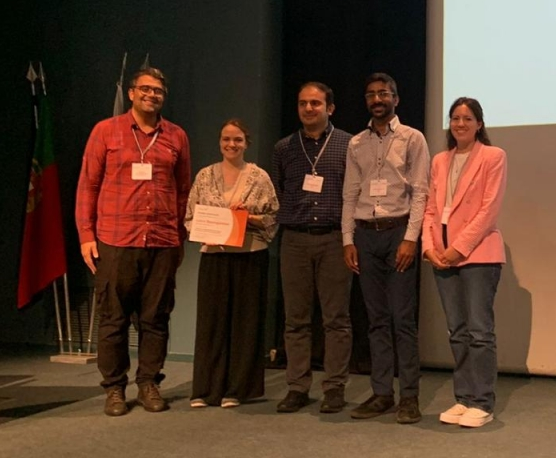Laura Baumgartner, awarded for her doctoral thesis on cell dynamics in complex multicellular systems
Laura Baumgartner, awarded for her doctoral thesis on cell dynamics in complex multicellular systems

Laura Baumgartner, a researcher of the BCN MedTech group, linked to the UPF Department of Information and Communication Technologies (DTIC), has been awarded the 2022 VPHi Best PhD Thesis Award in In Silico Medicine for her thesis entitled “Digging into Biologically-Driven Injury Mechanisms in the Intervertebral Disc - An Evidence-Based Network Modelling Approach to Estimate Cell Dynamics within Complex Multicellular Systems”.
The research, supervised by UPF researchers Jérôme Noailly and Miguel Ángel González Ballester, has received funding from the DTIC and the European Society of Biomechanics (Mobility Grant 2018), and support from important projects funded by the Spanish Ministry of Science and Innovation (RYC-2015-18888) and the European Commission (Disc4All-MSCA-2020-ITN-ETN 955735). The result of the research has provided a robust basis for a new responsible research and innovation initiative, called D-RISC, promoted together with the QUAES-UPF Chair.
The aim of Laura Baumgartner’s doctoral research project was to develop a new type of modelling, based on computational techniques of systems biology, to estimate cell responses in multicellular systems with complex, heterogeneous stimulus environments. On the one hand, the estimated cell responses refer to the arrangement of the cell to produce and degrade tissue. On the other hand, the heterogeneous environments considered in the modelling refer to the fact that cell responses are the result of the simultaneous action of groups of cells differently exposed to the influence of pro-inflammatory factors, combined with variable nutritional and mechanical environments. The research is to better understand the dynamics leading to intervertebral disc (IVD) degeneration.
Under the framework of Laura Baumgartner’s doctoral thesis, the PNt Methodology has, for the first time. allowed to estimate cell dynamics in the intervertebral disc, in response to different activities of the human being such as sleeping, walking or running
The researcher states that “the results of the thesis represent a novel approach to estimating cell dynamics, where the focus is set on what a cell is doing, rather than on how a cell is doing a certain action”. She admits that the way of thinking is rather different from other systems biology approaches.
The developed methodology consists of several sub-methods. These convert high-level experimental data into mathematical parameters, and integrate various experimental measurements in terms of stimulation and cell response, to calculate cell responses in complex environments that are difficult to reproduce experimentally. This innovative modelling is called time-dependent Parallel Networks Methodology (PNt Methodology). It allows, for the first time, evaluating biological risk factors related to histories of mechanical loads that can be counted in days, months or years, which is difficult to measure in patients.
In the framework of Laura Baumgartner’s doctoral thesis, the PNt Methodology has, for the first time, allowed estimating cell dynamics in the intervertebral disc, in response to different activities of the human being such as sleeping, walking or running. It has also been assessed for its ability on a biological level to reflect some observable aspects of the evolution of astronauts’ intervertebral discs during a six-month stay in space. Thus, this new way of computational modelling contributes to a better understanding of the mechanisms of biological injury in slow-developing disorders of tissues and organs that support mechanical loads, such as rheumatological disorders.
